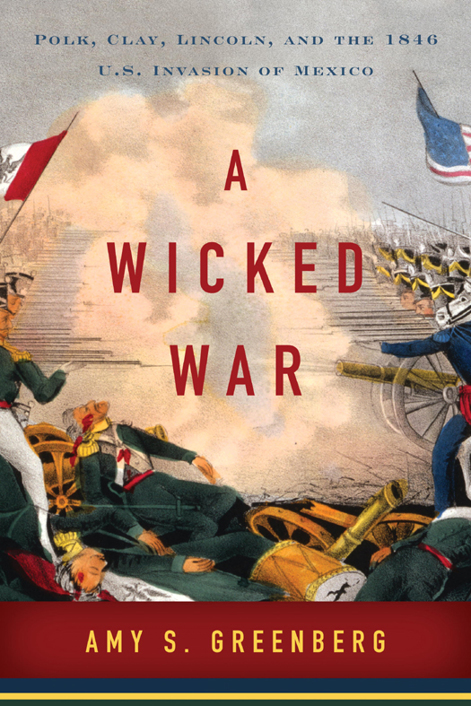
A Wicked War
Polk, Clay, Lincoln, and the 1846 U. S. Invasion of Mexico
کتاب های مرتبط
- اطلاعات
- نقد و بررسی
- دیدگاه کاربران
نقد و بررسی

September 10, 2012
The seldom-sung Mexican War emerges as one of America’s most morally ambiguous and divisive conflicts in this illuminating history by historian Greenberg (Manifest Manhood and the Antebellum American Empire), who gives sketchy, colorful recaps of the battlefield highlights, but focuses on the war’s politics and shifting ideological currents. Provoked by President James K. Polk to further his expansionist program and silence Whig critics, the war began as a wildly popular vehicle for manifest destiny and American fantasies of martial vigor. But Greenberg demonstrates the rapid spread of public disillusionment and opposition, despite triumphant victories, as casualties and desertion took their toll on war-weary soldiers; press reports of American atrocities tarnished the war’s glamour, and a nationwide antiwar movement condemned the invasion as an unjust landgrab. The author arranges her lucid narrative around vivid profiles of central and marginal figures, including first lady Sarah Polk, an influential adviser to her husband; Abraham Lincoln, whose politics were galvanized by the war; and envoy Nicholas Trist, who was so ashamed of the war that he disobeyed Polk’s orders and negotiated a relatively lenient peace treaty. Greenberg’s probing account of this war reveals its drama—and its very modern complexity. Photos, illus., maps. Agents: Sydelle Kramer and Susan Rabiner, Susan Rabiner Literary Agency.

September 15, 2012
A condensed new study of the Mexican-American war portrays America's terrible loss of innocence. Waging war against an unoffending neighbor changed the tenor of American politics in the mid 19th century, created a new crop of military leaders and aroused a deep anti-government suspicion among American citizens, writes Greenberg (History and Women's Studies/Penn St. Univ.; Manifest Destiny and American Territorial Expansion: A Brief History with Documents, 2011, etc.). The rebellion of Texas from Mexican rule created a clamor for annexation, taken up first by President John Tyler in advance of congressional approval. The author focuses mainly on five individuals whose destinies were intimately tied up in the war with Mexico. Former Speaker of the House Henry Clay was morally opposed to annexation and lost his bid for the presidency in 1844 to James Polk, who used the expansionist frenzy to win political advantage, becoming the key advocate of Texas and California annexation. In the wake of Clay's eloquent speech in Lexington, Ky., in 1847, denouncing the aggressive war against Mexico, Illinois congressman and fervent Clay admirer Abraham Lincoln distinguished himself in Congress with his own stirring emotional condemnation of the president's evasive tactics. Two other lesser-known figures appear prominently: Illinois patriot and Lincoln's Whig Party rival John Hardin represented the typical zealous volunteer to the Mexican conflict, grown quickly disillusioned by the senseless violence, while State Department clerk Nicholas Trist was secretly dispatched to Mexico by Polk to make a treaty advantageous to the U.S.--though Trist harbored great ambivalence. A well-rendered, muscular history of a war whose ramifications are still being carefully calibrated.
COPYRIGHT(2012) Kirkus Reviews, ALL RIGHTS RESERVED.

October 15, 2012
Historian Greenberg, who specializes in Manifest Destiny, advances a thesis about the expansionist doctrine's realization through the Mexican-American War of 184648. As he sees it, things could have been much worse for Mexico, for at times President James Polk demanded more Mexican territory than he eventually settled for. Greenberg argues that strengthening antiwar sentiment deterred Polk, the evidence for which she draws from four figures who opposed the war: Henry Clay, Polk's opponent in the 1844 election; Nicholas Trist, Polk's diplomat, who defied orders and negotiated the peace treaty; Abraham Lincoln; and Lincoln's now-forgotten Illinois political rival, John Hardin. Greenberg brings forth interesting details about each character's political life and stance toward proposals to annex Texas that posed an obvious risk of war. Particularly intriguing is the prominence Greenberg accords to Hardin, whose deepening doubt about the war never assumed public expression and who, killed at the Battle of Buena Vista, was honored as a war hero. Adding Polk's politically talented wife to the historical mix, Greenberg clothes a provocative main idea in a freshly original narrative.(Reprinted with permission of Booklist, copyright 2012, American Library Association.)

























دیدگاه کاربران